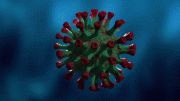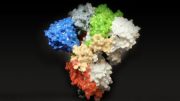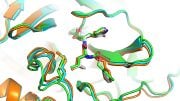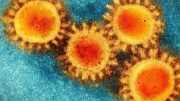
Researchers reporting have designed compounds that block the replication of coronaviruses similar to COVID-19, as well as other disease-causing viruses, in the lab.
New compounds block the replication of multiple viruses, including coronavirus.
According to a February 26 report from the World Health Organization, the Wuhan coronavirus has stricken more than 81,000 people and has caused over 2,700 deaths since the first cases in Wuhan, China, in December 2019. Now, researchers reporting in ACS’ Journal of Medicinal Chemistry have designed compounds that block the replication of similar coronaviruses, as well as other disease-causing viruses, in the lab. The compounds have not yet been tested in people.
The Wuhan coronavirus, also known as COVID-19, SARS-CoV-2, or 2019-nCoV, is a close relative to the severe acute respiratory syndrome (SARS) virus that caused an outbreak in 2003 (SARS-CoV-1), as well as the Middle-East respiratory disease virus (MERS-CoV) that emerged in 2012. All of these viruses cause flu-like symptoms and, frequently, pneumonia. However, no effective treatments have been developed, in part because the relatively small number of cases have not warranted large expenditures by pharmaceutical companies. Hong Liu, Rolf Hilgenfeld and colleagues envisioned a possible solution in the form of broad-spectrum antiviral drugs that target all coronaviruses, as well as enteroviruses — some of which cause conditions like the common cold; hand, foot and mouth disease; and the “summer flu.” All of these viruses share a similar protein-cutting enzyme, called the “main protease” in coronaviruses and the “3C protease” in enteroviruses, that is essential for viral replication.
The researchers examined X-ray crystal structures of the proteases and then made a series of α-ketoamide compounds that were predicted to fit snugly in the enzymes’ active sites, interfering with their function. By testing the molecules in the test tube and in human cells in petri dishes, they identified one versatile inhibitor that blocked multiple coronaviruses and enteroviruses, including SARS-CoV-1. Another molecule showed very strong activity against MERS-CoV, with moderate activity against the other viruses. Because the main proteases of COVID-19, MERS-CoV and SARS-CoV-1 are very similar, the inhibitors will most likely show good antiviral activity against the Wuhan coronavirus, the researchers say. Their next step will be to test the inhibitors in small-animal models of disease.
Reference: “α-Ketoamides as Broad-Spectrum Inhibitors of Coronavirus and Enterovirus Replication: Structure-Based Design, Synthesis, and Activity Assessment” by Linlin Zhang, Daizong Lin, Yuri Kusov, Yong Nian, Qingjun Ma, Jiang Wang, Albrecht von Brunn, Pieter Leyssen, Kristina Lanko, Johan Neyts, Adriaan de WildeEric J. Snijder, Hong Liu and Rolf Hilgenfeld, 11 February 2020, Journal of Medicinal Chemistry.
DOI: 10.1021/acs.jmedchem.9b01828
The authors acknowledge funding from the European Commission SILVER project, the German Center for Infection Research and the National Natural Science Foundation of China.









while my comment may be viewed as trivial and disgusting to mention in context of the problem being attacked, and possibly partially solved, it is annoying (for chemists, and organic chemists in particular) to see mistakes in chemical structures as all three above the text show
Whether they are right or wrong at least this focuses on stopping viral replication. Viruses are enclosed in a protein sphere, the viral capsid. The virus needs the capsid to attach to and invade the host cell. Benzalkonium chloride (BKC) strips away the capsid. BKC is highly corrosive so it cannot be ingested. It can be applied topically in diluted solutions to pubic regions, lips and rectal. A cheap and readily available BKC solution is Dettol. OK, stop laughing, it works wonders on Herpes. Gets rid of cold sores in 24 hours. I wish some viral researcher would look into it. Hope this helps someone!